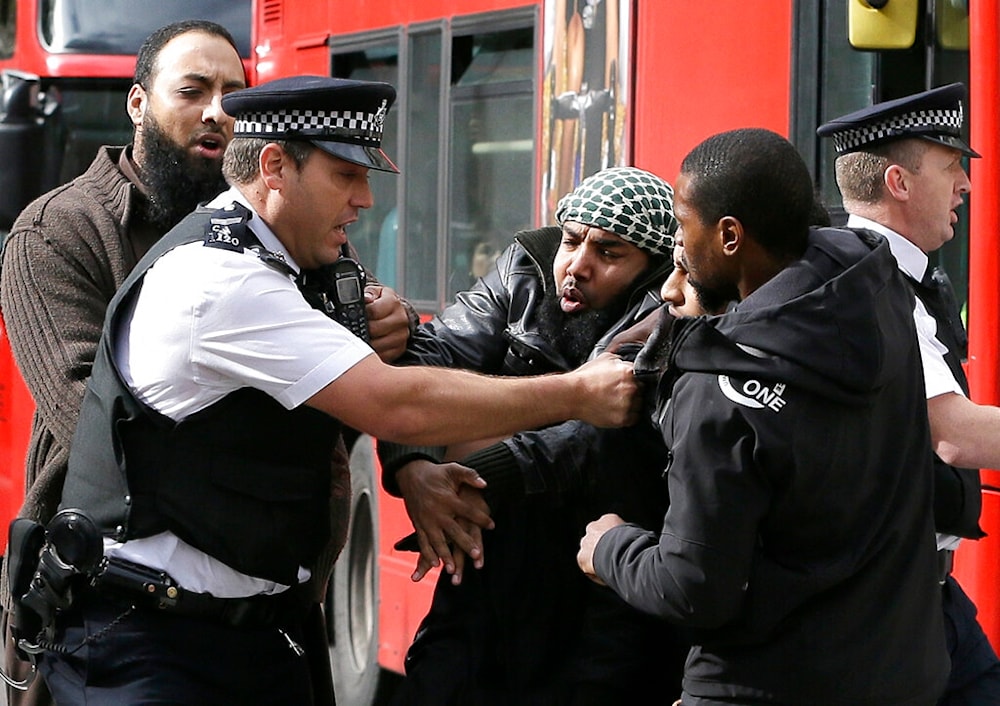UK Police chief calls for reforms against institutionalized racism
NPCC Chief Gavin Stephens calls for racial reforms that protect Black people against unnecessary police brutality.
-

Demonstrators clash with police officers outside The Royal Courts of Justice in London Friday, Oct. 5, 2012 (AP)
Gavin Stephens, the chair of the National Police Chiefs’ Council (NPCC) in the United Kingdom, called for the elemental redesign of national police regulations to deinstitutionalize the systematic racism the police force was founded upon.
Advocating for equality, Chief Stephens noted the slow-paced response officials have shown for a fundamental governing issue that enforces a more violent approach when convicting people of color, affirming that policies to downplay this excessive use of force must be litigated.
Moreover, in an interview for The Guardian, Stephens analyzed the design of the current police agency regulations and how Black input was excluded, which dismisses a historical struggle and imposes conduct that is built on a white supremacist viewpoint.
According to Stephens, the layout of such analysis does not mean all police officers are racist, but that the policies, practices, and implementation of policing need to be discussed to detach preexisting institution-based, not individual, prejudices from the law.
Anti-racism to save face
Stephens referenced a report formulated last year that examined the failure of police reform against institutionalized discrimination, saying the findings were true and needed to be considered while handling police internal affairs.
This comes as the institution still debates whether it has a fundamental bias that incites violence against Black people and as Metropolitan police commissioner, Mark Rowley, rejects all findings that allude to the regularized discrimination in the police force, including racism and misogyny, terms he deemed "unclear".
#Britain's police watchdog has called for an explanation for the rampant misogyny and "disgraceful" behavior after a newly published report cited widespread bullying, sexual harassment, and discrimination. pic.twitter.com/VzlZT86Ci0
— Al Mayadeen English (@MayadeenEnglish) February 7, 2022
Police Scotland, the second biggest force in the UK, Avon and Somerset Police, and the British Transport Police have accepted that the matter applies to them, while the biggest three forces in England – the Met, West Midlands Police, and Greater Manchester Police all refused the claim.
The Met, in particular, was the center of the report after scholars indicated that it was the institution's inherent racism that stopped it from investigating the murder of a Black kid years before and its inherent misogyny that gave a MET police officer the power to rape and kill a young marketing executive in March 2021, Sarah Everard, sparking a national outcry.
But following a spike in police brutality, specifically the brutal murder of George Floyd by a US officer, the NPCC kickstarted a race action plan that gives chiefs the soft power to question officers who are suspected of acting on their racial bias. However, it appeared to be a symbolic move that achieved very negligible change in the three years since its launch.
The deconstruction of a racist social construct
Gavin Stephens' advocacy for reform in the police force was sparked by the discrepancies he witnessed between police conduct with white people versus Black people.
The racial plan determined that “Black people are seven times more likely to be stopped and searched than white people and five times more likely to be subjected to the use of force … 10% of our recorded searches, 27% of use-of-force incidents and 35% of Taser incidents involved someone from a Black ethnic group. The latest estimates suggest that only 3.5% of the population is Black.”
Stereotyping Black men as criminals also does not advance change from within. Regarding this matter, Stephens equalized the danger both white and Black men can yield based on preexisting conditions and the culture they are surrounded by, emphasizing the need for an equal perception of all those who are convicted or interrogated, which reduces the chances of the perpetuation of violence.
“If you’ve got that cultural connection, if you’ve got something in common with the person that you’re dealing with on the street, there’s a higher likelihood that you’re going to be able to resolve that issue without resorting to the use of force,” he said.

 4 Min Read
4 Min Read








